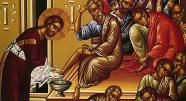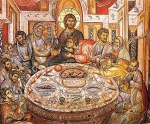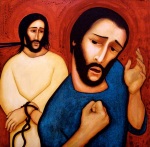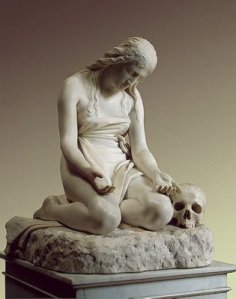I work for an organization that identifies itself as a Christian Publisher. Because of this fact, we have the opportunity to gather in worship for certain Christian Feasts. Because our environment includes people from many different denominations, the flow of services is often different from what I am used to observing. Today, my work unit was responsible for leading the Maundy Thursday worship service. I was asked to deliver the “message” although in my own tradition I would call it a Homily. Humbly, here is what I offered to our group.
+++++++++++++++++++++++++++++++++++++++++++++++++++++
We gather today to worship in Word and Sacrament. This day, what we call “Maundy Thursday,” or “Holy Thursday,” is the beginning of what is often called “The Easter Tridiuum” – three days of remembering the Passion, Death, and Resurrection of Jesus. The word Maundy comes from the Latin word mandatum, which means “commandment.” In the act of washing the Apostles feet, Jesus gives them the commandment to love and serve one another as I have loved you. 
It is also the day Jesus celebrated The Last Supper with his Apostles during their Passover meal, thereby instituting the sacrament we know as Holy Communion, The Lord’s Supper, The Mass, or Holy Eucharist. Jesus commanded his guests to “do this in remembrance of me.” This serves as a link to connect The Passover meal to The Lord’s Supper and that Jesus was the new, and final, Passover Lamb. 
We’ve just celebrated the sacrament of Holy Communion. We listened to the words of Scripture tell us the story of that fateful evening and the events which led up to it. We know that in three days, there will be great rejoicing. But…..let us not get ahead of ourselves. We cannot get around the fact that we must first witness the betrayal, a trial, great suffering, and a crucifixion.
Some of you will attend worship services later this evening. You may hear sermons about the significance of The Lord’s Supper and the Commandment we are given to love and serve one another. You may wash one another’s feet. You may witness the beauty of your worship space stripped bare and left empty. Memories will no doubt be formed in your mind. When my own son was three years old I took him to the Maundy Thursday service at our church. I tried to explain what would happen prior to entering the sanctuary, mainly in hopes that he would remain quiet and civilized. We entered the Nave, armed with crayons and paper. To my amazement, and relief, he was not only quiet but attentive to what was going on around him. As if he knew the solemnity of the events were important and meant something. The altar was stripped, and at the end of the service we all departed in silence while the lights were turned off. I was carrying Gabe in my arms … he leaned into my ear and asked in a saddened tone, “Why did God turn the lights out, mommy?” Remarkable!
Why did God turn out the lights? Indeed!
 Let us go to the Mount of Olives for a moment. Jesus is praying and asking God that he not have to suffer. We can sense in his words a great deal of fear and anxiety. He is overwhelmed with grief when he finds that even his disciples were unable to keep vigil. Jesus is arrested; he has been betrayed, he is alone, in agony, despair and feels the deepest levels of loneliness. Look at our empty altar here and remember.
Let us go to the Mount of Olives for a moment. Jesus is praying and asking God that he not have to suffer. We can sense in his words a great deal of fear and anxiety. He is overwhelmed with grief when he finds that even his disciples were unable to keep vigil. Jesus is arrested; he has been betrayed, he is alone, in agony, despair and feels the deepest levels of loneliness. Look at our empty altar here and remember.
The disciples scatter in the midst of the arrest.
Peter denies Jesus; bitter weeping ensues.
Darkness and emptiness enclose upon those who were closest to Jesus. Look at our empty altar here and remember.
We live with an interesting dichotomy in the next three days. We are on this side of the Resurrection and yet we spend these few days in repentance and mourning, or at least we should. I understand that we have been redeemed and should give every thanks for it; however, I cannot help but stop and think about the utter chaos, fear, loneliness, and despair that the scattered disciples must have felt. Their beloved teacher and Lord was gone! They had not yet witnessed the Resurrection. From where we are, is it even possible to know how they felt that night or the next day watching Jesus die on the Cross?
Well, maybe. Have you ever spent any part of your life outside of the Church? There is no doubt in my mind that you, or maybe a family member, a colleague, those we encounter on the street have experienced some form of grief, depression, sickness, utter hopelessness. I recall going through a period of time in that state. After God led me back to the Church, and specifically to our Lord’s Table, I’m unable to fathom now how I survived without it. There have been times when I have had to cling tightly to the promises of my baptism.
But we also run into those same people in the pews next to us. We try to tend to those in our midst with care and compassion. In general though, we often run from suffering and despair. We hide it in ourselves because we don’t want to make others feel uneasy OR we discreetly step away from those we encounter in this state because we’re not sure what to say or we end up offering some platitude. Silence often makes us feel uncomfortable. What we really want is to make it all better, and QUICKLY! I have a close friend, a deeply committed Christian, who was suffering from depression. A fellow parishioner told him that what he really needed was to have a more “Christian attitude.” Needless to say, that wasn’t helpful and only added to his grief and guilt. Our society is consumed with the need to ‘be happy’ and individuals the need to feel special.
I know, let’s all go to the empty tomb and we’ll know then that it’s going to be alright!!! Yes, but….it’s not really about me, is it?
Look here, at our empty altar, and remember. We cannot go to the empty tomb without first standing at the Cross. John Henry Newman wrote in his sermon, The Cross of Christ
…the doctrine of the Cross is not on the surface of the world. The surface of things is bright only, and the Cross is sorrowful; it is a hidden doctrine; it lies under a veil; it at first sight startles us, and we are tempted to revolt from it. Like St. Peter, we cry out, ‘Be it far from Thee, Lord; this shall not be unto Thee.’ And yet it is a true doctrine; for truth is not on the surface of things, but in the depths. (1242)
We cannot get around it today or tomorrow – the altar is empty! Despite the desperate need to do so, don’t run from it or from those who do not yet know the joy of the Resurrection. For the next couple of minutes, we will sit in silence. After the Benediction you may depart in silence or remain here in prayer and meditation. For the next couple of days, allow yourself the space to contemplate what the Cross means for our world. The next time you gather for Holy Communion, give thanks and praise that our Lord is present and real!
Newman, John Henry. Parochial and Plain Sermons. “The Cross of Christ: The Measure of the World.” Ignatius Press: San Francisco. 1997.













